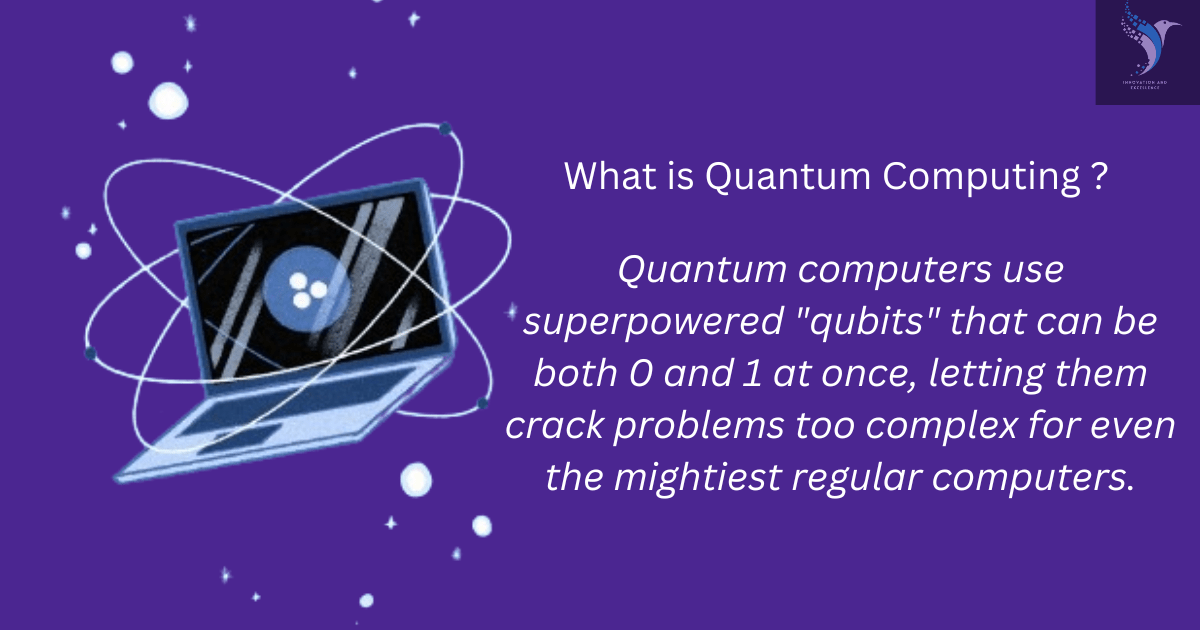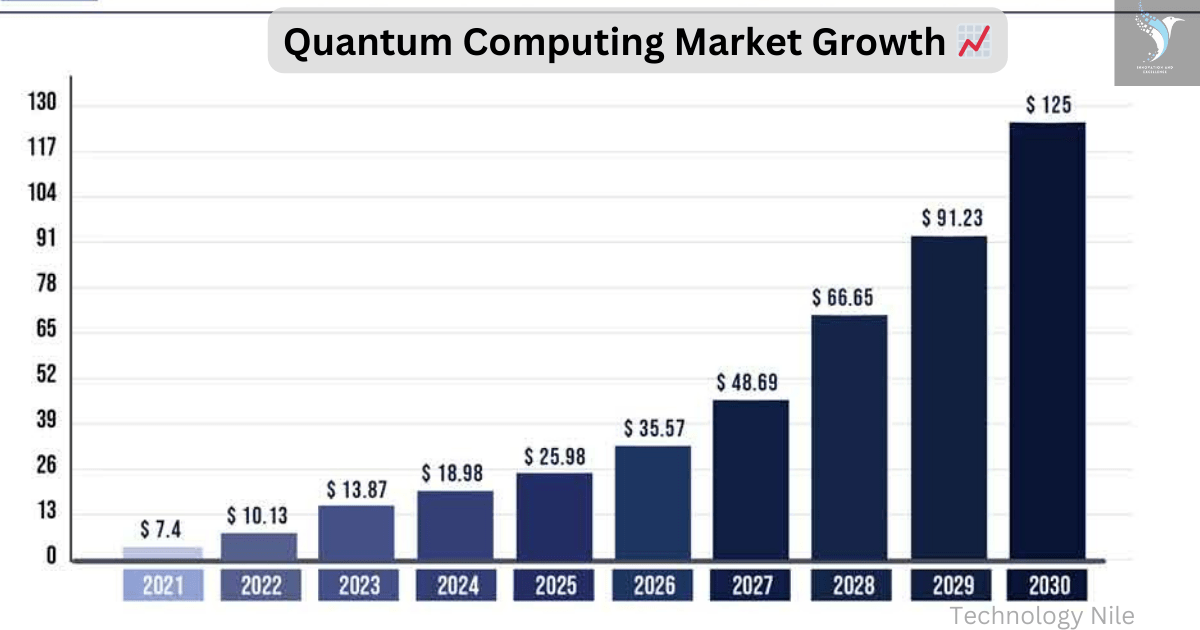Hello all of our readers Are you ready to explore quantum computing in deep
What is Quantum Computing?

Quantum computers use the principles of quantum mechanics, such as superposition and entanglement, to perform calculations. Superposition allows qubits (quantum bits) to exist in multiple states at the same time. Entanglement allows qubits to be linked together, so that what happens to one qubit instantly affects the others, no matter how far apart they are.
Imagine your regular computer uses switches, either on (1) or off (0). Quantum computers use special switches called qubits. These qubits are intriguing : they can be on, off, or both at the same time (like a dimmer switch, not just a light switch).
Think of it like flipping a coin:
Regular computer: You flip the coin, landing on heads (1) or tails (0).
Quantum computer: You flip the coin, and it magically stays spinning heads and tails at the same time (superposition)!
This “both-at-once” ability means qubits can explore many possibilities simultaneously, like checking all paths in a maze at once. This makes them super fast at solving complex problems that would take regular computers forever.
So, qubits are the special switches that give quantum computers their super speed, basically superpowers for solving problems.
Imagine two coins linked by a magical thread. When you flip one, the other instantly flips the opposite way, no matter how far apart they are. This connection between qubits lets them work together in special ways, further amplifying their problem-solving power.
quantum computing harnesses the strangeness of the quantum world to tackle problems beyond the reach of regular computers.
Qubits vs. bits: Classical computers store information in bits, which can be either 0 or 1. Quantum computers use qubits, which can be 0, 1, or both at the same time (a state called superposition). This allows quantum computers to explore many possibilities simultaneously

History of quantum computing
(1900-1980s):

One of the earliest ideas related to quantum computing was proposed in the 1980s by physicist Richard Feynman, who argued that quantum computers could potentially simulate physical systems in a more efficient manner than classical computers.
Foundational Physics: The groundwork was laid with discoveries in quantum mechanics by Planck, Einstein, Bohr, and others, revealing the strange and powerful rules governing the microscopic world.
First Ideas: Richard Feynman and Paul Benioff envisioned the possibility of harnessing quantum phenomena for computation in the 1980s.
Quantum Computing News:

Market Growth:
The global market for quantum computing is expected to witness a CAGR of 48.1% from 2023 to 2028.
CAGR – Compound annual growth rate
The Global Quantum Computing Market Size was valued at USD 13.67 Billion in 2022 and the Worldwide Quantum computing Market Size is expected to reach USD 143.44 Billion by 2032, according to a research report published by Spherical Insights & Consulting.
In 2022, the Global Quantum Computing Market was valued at USD 548.3 Million and is expected to reach USD 8,285.6 Million by 2032, with a remarkable Compound Annual Growth Rate (CAGR) of 31.2% between 2023 and 2032.

Google Investing $50 Million in a Quantum Computing Partnership with the University of Chicago, and University of Tokyo – Quantum Computing Report.
TCS: India’s biggest IT company has started TCS Quantum Computing Lab on AWS to help its clients first pilot, and then the regularly use, quantum computing for challenges that may be too difficult for classical computers to solve in a timely manner.
$2.35 billion For example, funding in the quantum computing space has reportedly seen record levels—$2.35 billion in investments in quantum technology start-ups (both hardware and software) in 2022—with a significant ramp-up in the last two years.
The global quantum computing market size in terms of revenue was estimated to be USD 866 Million in 2023 and is poised to reach USD 4,375 Million by 2028, growing at a CAGR of 38.3% from 2023 to 2028. The new research study consists of an industry trend analysis of the market.
IBM
IBM, the current leader in quantum computing, last year launched its Quantum System Two, a modular quantum computer powered by an IBM-made chip called the Heron.
Why to learn Quantum computing ?
Become a Future-Ready Problem Solver: Quantum computers tackle challenges considered impossible for today’s machines. Learning their principles equips you to navigate the frontiers of fields like:
- Drug Discovery: Simulating molecules to design revolutionary new medicines.
- Materials Science: Unlocking breakthroughs in energy storage, construction, and futuristic materials
- Financial Modeling: Optimizing complex financial systems and minimizing risk.
- Cryptography: Designing unbreakable new codes and cracking the ones of tomorrow
Annual Salary for Quantum computing engineers ?
the average annual salary for a quantum computing engineer in the United States is around $147,524, with top earners making upwards of $205,500. In other countries like India, the average salary is also quite high, ranging from ₹6,23,753 to ₹9,00,000 per month.
Jobs opportunities in Quantum Computing ?
- Quantum Hardware Engineer: Design, build, and maintain sophisticated quantum hardware. This role requires expertise in electrical engineering, cryogenics, and potentially nanotechnology. (Image of Quantum Hardware Engineer working on a circuit board)
- Quantum Systems Engineer: Integrate various components of a quantum hardware system, including control electronics, software, and cryogenic infrastructure. You’ll need strong systems engineering skills and the ability to interface different technologies. (Image of Quantum Systems Engineer working on a complex system diagram)
- Quantum Cryogenic Engineer: Manage and maintain the ultra-cold environment required for quantum computers to operate. This role demands knowledge of thermodynamics, cryogenics, and vacuum technology. (Image of Quantum Cryogenic Engineer monitoring gauges and valves)
- Quantum Software Engineer: Develop software tools and libraries for programming and running algorithms on quantum computers. Familiarity with high-performance computing and specialized quantum programming languages like Qiskit or Cirq is essential. (Image of Quantum Software Engineer writing code on a computer screen)
- Quantum Algorithms Researcher: Design and analyze algorithms that leverage the unique capabilities of quantum computers to solve complex problems. A strong background in theoretical computer science, mathematics, and quantum algorithms is necessary. (Image of Quantum Algorithms Researcher working on a whiteboard with complex equations)
- Quantum Compiler Engineer: Develop compilers that translate high-level quantum code into low-level instructions for specific quantum hardware platforms. Expertise in compiler design and understanding of quantum architecture is crucial. (Image of Quantum Compiler Engineer working on a compiler code structure)
*Interesting facts about Quantum computing
Cold as ice: Quantum computers are incredibly sensitive to their environment and require near absolute zero temperatures (-273°C) to operate properly. This means they need to be housed in special chambers filled with liquid helium, making them quite the chilly neighbors!
Unbreakable codes: Quantum computers could crack the encryption methods we currently rely on to keep our data safe. But don’t worry, quantum-resistant cryptography is already being developed to stay ahead of the game!
Time travel (sort of): While it’s not the kind of time travel you see in movies, quantum computers could help us simulate the behavior of complex systems over long periods of time. This could be used to study things like climate change or the evolution of the universe.
The future is quantum: Although still in its early stages, quantum computing has the potential to change the world in countless ways. From materials science to finance, artificial intelligence to medicine, the possibilities are endless. So keep an eye on this exciting field, because it’s about to get even more mind-blowing!
Superposition: Unlike our classical computers that only exist in one state at a time (0 or 1), qubits in a quantum computer can be in multiple states simultaneously! This phenomenon, called superposition, allows them to explore a vast number of possibilities at once, giving them a massive speed advantage over classical computers for certain tasks. Imagine flipping a coin that can be heads, tails, or both at the same time!
From simulating protein folding to designing new drugs, quantum computers have the potential to revolutionize medicine. They could help us understand complex diseases and develop personalized treatments in ways that are simply impossible with classical computers.
FAQ?
Q1 What is the salary of quantum computer engineer?
Ans. Quantum Engineer Salaries in India
The average salary for Quantum Engineer is ₹6,23,753 per month in the India.
Q2 What is the best quantum computing stock?
Ans. Best Quantum Computing Stocks To Buy Now
Quantum Computing Inc. (NASDAQ:QUBT) …
D-Wave Quantum Inc. (NYSE:QBTS) …
Rigetti Computing, Inc. (NASDAQ:RGTI) …
IonQ, Inc. (NYSE:IONQ) …
Booz Allen Hamilton Holding Corporation (NYSE:BAH) Number of Hedge Fund Holders: 25. …
International Business Machines Corporation (NYSE:IBM)
Q3 What is an example of quantum computing?
Ans. Quantum computers can run complex simulations. They’re fast enough to be used to simulate more intricate systems than classical computers. For example, this could be helpful for molecular simulations, which are important in prescription drug development. Optimization.
Q4 Is AI a quantum computing?
Ans.In the future, artificial intelligence is likely to become supercharged by quantum computing. It’s a partnership that could change the world. The growing wonder and value of artificial intelligence (AI), triggered by the broad availability of generative AI in late 2022, is understandable.
Q5 Is quantum computing high paying?
Ans. Quantum Computing Scientist Salary. $77,500 is the 25th percentile. Salaries below this are outliers. $155,000 is the 75th percentile.
Q6 Is quantum computing a good career choice?
Ans.A career in quantum computing can offer engaging work with a high annual salary. Here are some tips to help you land your first job in the field. Quantum computing uses quantum mechanics to more quickly solve problems that are too complex for non-quantum, i.e., classical, computers.
Q7 How much does JP Morgan pay quantum computing?
Ans.The estimated total pay for a Quant at J.P. Morgan is $216,089 per year.
Q8 Is Google building a quantum computer?
Ans.Google’s latest iteration of its quantum machine, the Sycamore quantum processor, currently holds 70 qubits. This is a substantial leap from the 53 qubits of its earlier version.
Q9 Is quantum computing difficult to study?
Ans.As you might have guessed, quantum computing is a complex field that’s difficult for non-experts to understand. However, it is possible to grasp some of the fundamental concepts, giving you a basic understanding of how quantum computers work.
Q10 What is the salary of IBM quantum computer engineer?
Ans. Annual Salary Weekly Pay
Top Earners – $170,000 $3,269
75th Percentile -$123,000 $2,365
Average – $111,573 $2,145
25th Percentile -$96,500 $1,855
Q11 How much do Google quantum engineers make?
Ans.As of Jan 5, 2024, the average annual pay for a Google Quantum Ai in the United States is $108,306 a year. Just in case you need a simple salary calculator, that works out to be approximately $52.07 an hour. This is the equivalent of $2,082/week or $9,025/month.
Q12 Is quantum computing the future?
Ans.In fact, experts today suggest that with its widespread applications and transformative potential, quantum computing is leading the next technological revolution.
Q13 Is quantum computing a lot of math?
Ans.Everything in quantum computing, from the representation of qubits and gates to circuits’ functionality, can be described using various forms of Linear Algebra. Another math field that is really involved in quantum computing is the basics of probability theory. That’s it. Linear algebra and probability theory.
Q14 Which language is good for quantum computing?
Ans.Quantum circuits are created and manipulated using Python.
Q15 Are quantum computing jobs in demand?
Ans.Regarding job opportunities in quantum computing in India, they are currently limited compared to more established fields. However, as the field continues to advance, it is expected that the demand for skilled professionals in quantum computing will increase.
Q16 Does Google hire quantum computing?
Ans.Quantum research careers at Google
Our interdisciplinary team hires for a variety of roles, and we’re always welcoming new applicants. While we may not always have open roles for the Quantum AI team, we regularly post new opportunities as they become available and we encourage you to check back often.
Q17 What is more powerful than quantum computing?
Ans.One example is a hypothetical concept known as a “hypercomputer,” which would operate beyond the limits of quantum computing. Another potential advancement is the development of advanced artificial intelligence algorithms that could outperform quantum computers in certain tasks.
Q18 Can I use Python for quantum computing?
Ans.Python is one of the most popular programming languages. However, did you know you can use Python to program a quantum computer? Many use Python and an appropriate toolset to program a quantum computer from quantum companies like IBM and Google.
Q19 Does ChatGPT use quantum computing?
Ans.Quantum computing is already proving its worth in improving AI by discovering patterns in large, complex datasets. Sam Lucero, chief quantum computing analyst at tech analyst and consultancy firm Omdia, sees a role for quantum computing in NLP and, ultimately in ChatGPT and generative AI in general.
Q20 Does quantum AI make money?
Ans.Quantum AI claims a 90% win rate, though this cannot be independently verified. Quantum AI sounds appealing on the surface, but trading bots are risky, and there is no guaranteed profit.
Learn cybersecurity –https://technologynile.com/cybersecurity-complete-basics/?amp=1#more-99